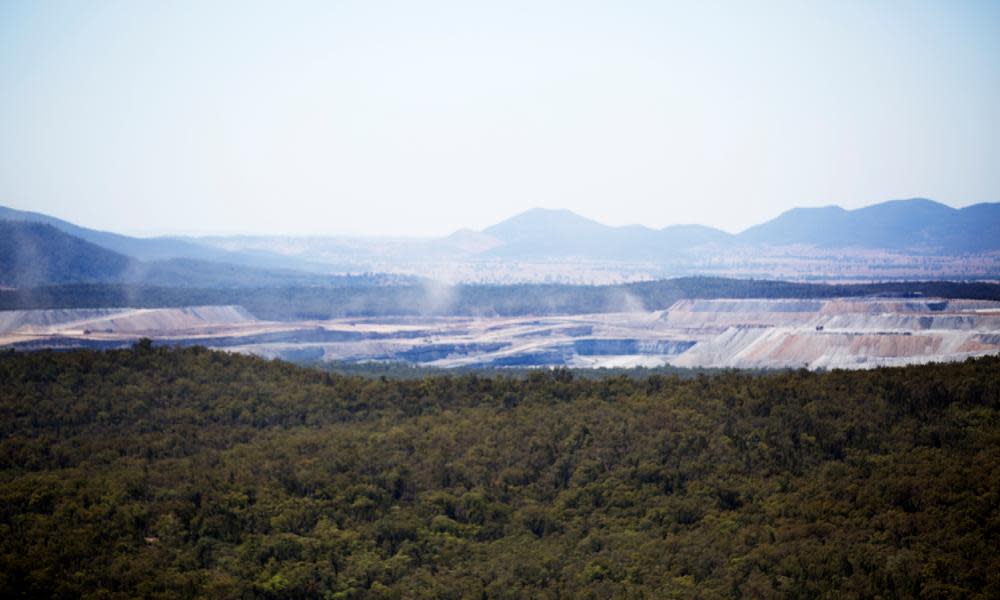Whitehaven Vickery mine expansion to extract 250% more coal approved by NSW

New South Wales authorities have approved a Whitehaven Coal plan to develop an expanded new coalmine in the state’s north-west.
The decision allows 168m tonnes to be extracted from the proposed Vickery coalmine, near Boggabri, over 30 years. Between 60% and 70% of it is expected to be metallurgical coal used in steel-making and the remainder thermal coal for electricity generation.
Related: Forgotten farmers, mining and anti-green invective: how the Nationals became a party for coal
The mine was originally approved in 2014 for the extraction of 135 million tonnes of coal over 30 years, but Whitehaven submitted a new application to expand the project. The extension approved by the state’s independent planning commission allows for 10 million tonnes of coal to be extracted annually, an increase of 250% on the original proposal.
In a statement on Wednesday morning, the commission said it had scrutinised key issues including greenhouse gas emissions, the effects of the project on agricultural land, water, wildlife and heritage, its socioeconomic impacts, and noise and air quality.
It said when assessed against the state’s environment and planning laws it found “the impacts associated with the project are acceptable and the project is in the public interest”.
The commission said when compared to the original project approved in in 2014, the environmental impacts of the expanded project were not significantly greater.
In its statement of reasons, it noted community concern at public hearings about the development of a greenfield coalmine at a time when countries were working towards achieving a global goal of zero net emissions.
“If we want to be minimising the kind of climatic effects on our communities and across the globe, we really need to not be opening any new fossil fuel projects any more and, of course, this is a new one,” one resident told a hearing.
The commission found that proposed changes to Whitehaven’s on-site operations would reduce the project’s scope one emissions – that is those emissions that are a direct result of the mine’s construction and operations – by about one million tonnes to 3.1 million tonnes.
But it found the larger project would increase its scope three emissions – which occur largely from the burning of coal after it is sold into the market, mostly overseas – by 100 million tonnes over the life of the mine to a total of 366 million tonnes.
The commission found the likely emissions associated with the project were not inconsistent with the state’s climate change policy framework, which aims to achieve net zero emissions by 2050, noting the framework “does not set prescriptive emission reduction targets and sets policy direction for government action”.
It noted Australia was not required to account for scope three emissions associated with projects as these would be factored into the accounting of countries to whom the coal was sold.
Related: Gomeroi custodians lose bid to protect sacred sites from NSW Shenhua coalmine
“The commission is of the view that the additional environmental and amenity impacts can be appropriately managed and mitigated in accordance with the applicable guidelines and policies,” it said.
“The commission finds that the project would generate significant social and economic benefits for the local area, north-west region and to NSW. This includes a direct capital investment of $607m and up to 450 jobs during operations.”
Whitehaven Coal welcomed the decision, which it said followed a lengthy evaluation and community consultation.
China produces the most heat-trapping pollution, followed by the US. But historically, the US has contributed more carbon dioxide to the atmosphere than any other nation. The US also has high emissions per capita, compared to other developed countries. And Americans buy products made in China, therefore supporting China's carbon footprint.
Its chief executive, Paul Flynn, said the company would now focus on obtaining secondary approvals it required and any further refinement of the project that was necessary before it commenced work.
“Vickery will be a predominantly metallurgical coalmine and will service established and emerging markets for high quality coal in our near region,” he said.
“Vickery will entail capital expenditure of $700m is expected to generate employment for 500 people during the construction phase and 450 ongoing operational roles.”
The approved project is subject to 184 conditions.
The commission’s decision to allow the mine to proceed comes a day after the NSW resources regulator charged two Whitehaven subsidiaries with 16 breaches of the state’s mining laws at another underground mine at Narrabri.
The environmental group Lock the Gate had called on the commission to factor these breaches into its decision.
The commission addressed the new charges in its statement, saying through the course of the public inquiry it had received submissions related to Whitehaven’s record of compliance with state laws.
“The commission notes that there is no fit and proper person test in respect of development consents and that matters such as the identity of an applicant or past planning law breaches have been found to be irrelevant considerations for consent authorities such as the commission,” it said.
Related: NSW and Queensland coal industry uses as much water as all Sydney households, report finds
Lock the Gate said on Wednesday the decision was bitterly disappointing and “an indictment of the Berejiklian Government’s failure to protect farmland, communities, and water resources”.
“Boggabri will now essentially be hemmed in from all sides by large coalmines. It will no longer be a farming community in any sense, but a coalmining service centre,” farmer Sally Hunter said.
“Families have left, and the social fabric of the community is being torn apart. Farmers near the mine will struggle to compete with Whitehaven for access to water, and the dust and noise will create major issues.”


